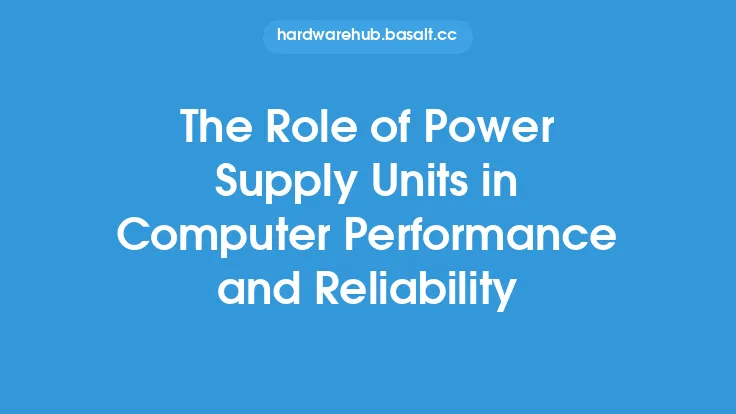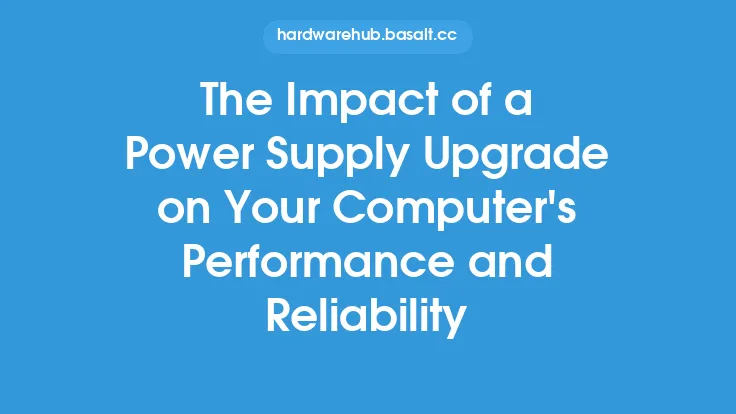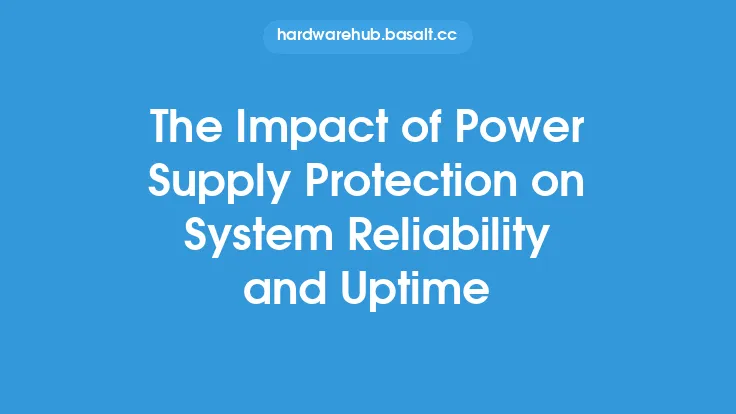When it comes to power supplies, there are many myths and misconceptions that have been perpetuated over the years. These myths can lead to confusion and poor decision-making when it comes to selecting and using power supplies. In this article, we will delve into the world of power supplies and debunk some of the most common myths and misconceptions.
Introduction to Power Supply Myths
One of the most common myths surrounding power supplies is that a higher wattage power supply is always better. While it is true that a higher wattage power supply can provide more power to components, it is not always necessary. In fact, a power supply that is too large for the system can be inefficient and waste energy. Additionally, a higher wattage power supply can also generate more heat, which can lead to reduced lifespan and reliability.
The 80 PLUS Certification Myth
Another myth surrounding power supplies is that the 80 PLUS certification is the only factor to consider when evaluating efficiency. While the 80 PLUS certification is an important indicator of a power supply's efficiency, it is not the only factor. The 80 PLUS certification only measures efficiency at three specific loads: 20%, 50%, and 100%. However, most systems do not operate at these exact loads, and the power supply's efficiency can vary significantly at different loads. Therefore, it is essential to consider other factors, such as the power supply's design, components, and testing results, in addition to the 80 PLUS certification.
The Modular Cabling Myth
Modular cabling is a feature that allows users to customize their power supply cables to only include the necessary connections. However, some people believe that modular cabling can improve the overall efficiency and performance of the power supply. While modular cabling can make cable management easier and reduce clutter, it does not have a significant impact on the power supply's efficiency or performance. In fact, some modular power supplies can actually have higher losses due to the additional connectors and cables.
The Single-Rail vs. Multi-Rail Myth
Another myth surrounding power supplies is that single-rail power supplies are always better than multi-rail power supplies. While single-rail power supplies can provide more power to a single component, they can also be less flexible and more prone to overloading. Multi-rail power supplies, on the other hand, can provide more balanced power distribution and reduce the risk of overloading. However, the choice between single-rail and multi-rail power supplies ultimately depends on the specific system configuration and requirements.
The Overvoltage Protection Myth
Overvoltage protection (OVP) is a feature that protects the power supply and system components from voltage spikes and surges. However, some people believe that OVP is not necessary or that it can actually cause problems. While it is true that OVP can sometimes cause issues with certain system configurations, it is an essential feature that can prevent damage to the power supply and system components. In fact, most modern power supplies have OVP circuits that are designed to be robust and reliable.
The Efficiency at Low Loads Myth
Some people believe that power supplies are only efficient at high loads and that they waste energy at low loads. While it is true that some power supplies can be less efficient at low loads, many modern power supplies are designed to be efficient across a wide range of loads. In fact, some power supplies can achieve high efficiency even at very low loads, thanks to advanced designs and components. However, it is essential to check the power supply's efficiency specifications and testing results to determine its performance at different loads.
The Power Supply Noise Myth
Power supply noise is a common issue that can be caused by a variety of factors, including the power supply's design, components, and cooling system. However, some people believe that power supply noise is always a problem or that it can be eliminated entirely. While it is true that some power supplies can be noisier than others, many modern power supplies are designed to be quiet and reliable. In fact, some power supplies can operate at very low noise levels, thanks to advanced cooling systems and noise-reducing technologies.
The Power Supply Lifespan Myth
Finally, some people believe that power supplies have a limited lifespan and that they need to be replaced regularly. While it is true that power supplies can degrade over time, many modern power supplies are designed to be reliable and long-lasting. In fact, some power supplies can last for many years, even in demanding environments, thanks to high-quality components and robust designs. However, it is essential to follow proper maintenance and usage guidelines to ensure the power supply's lifespan and reliability.
Conclusion
In conclusion, there are many myths and misconceptions surrounding power supplies that can lead to confusion and poor decision-making. By understanding the facts and debunking these myths, users can make informed decisions when selecting and using power supplies. Whether you are a seasoned enthusiast or a beginner, it is essential to consider the power supply's specifications, design, and testing results to ensure that you get the best performance and reliability for your system. By doing so, you can avoid common pitfalls and ensure that your power supply provides reliable and efficient power to your system for years to come.





